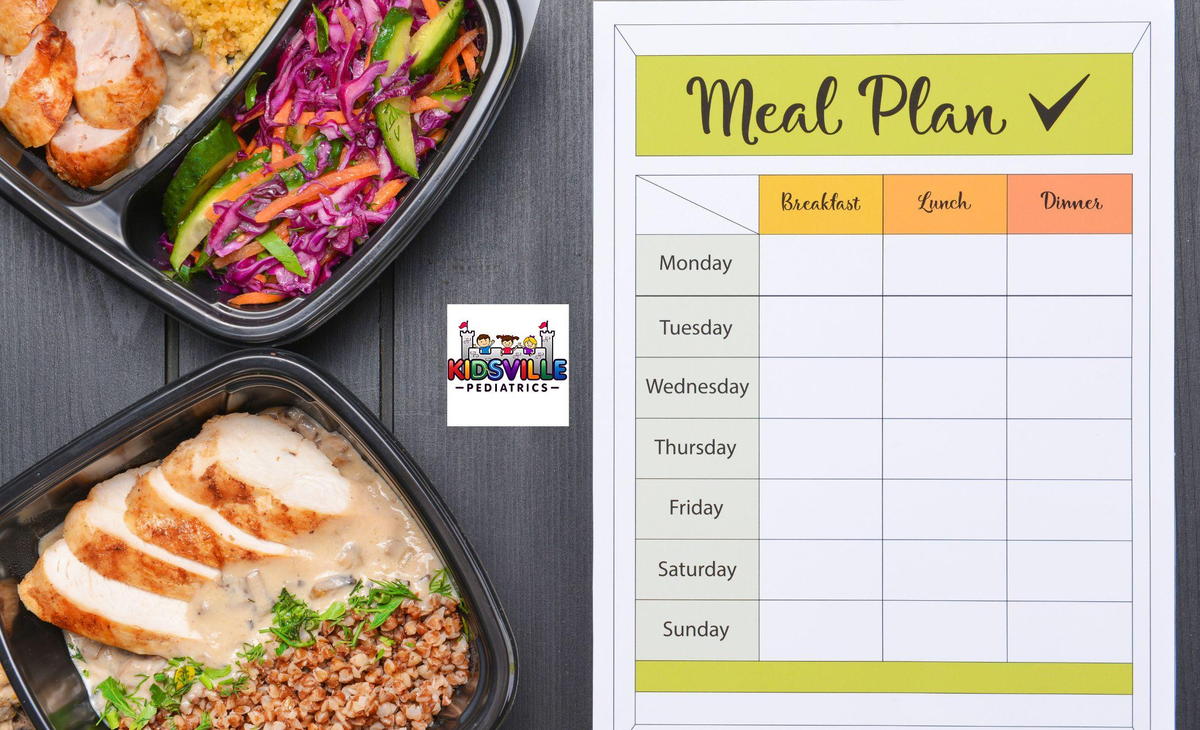
Whether you're raising a toddler or a teenager, establishing healthy eating habits is essential to your child’s well-being. At Kidsville Pediatrics, we know it can be challenging to manage family meals and encourage smart food choices, especially when life gets busy. However, with the right strategies, you can nurture positive eating habits and make balanced nutrition a part of your daily routine.
Here are five tried-and-true strategies to help improve your child's nutrition and promote healthy eating in your household. Implementing these tips can foster long-lasting, healthy eating habits for your children.
1. Have Regular Family Meals
Family meals provide more than just nourishment. They create an environment where children feel supported and secure, while also promoting healthy eating. When you eat together regularly, your children benefit in more ways than you may think. Studies have shown that children who participate in family meals are:
More likely to eat fruits, vegetables, and grains.
Less likely to consume unhealthy snacks or fast food.
Less likely to engage in risky behaviors like smoking, drinking, or drug use.
Family meals are also an opportunity for you to model healthy eating behaviors for your children. When they see you enjoying healthy foods, they’re more likely to follow suit.
How to Make Family Meals Work:
Let your child invite a friend over for dinner to make mealtime more engaging.
Involve your kids in planning and preparing meals, which can spark their interest in cooking and eating healthy.
Keep the conversation light and positive at the dinner table. Avoid lecturing or turning meals into a battleground over food.
Flexibility is key. Family meals don’t have to be perfect or formal. Whether it’s takeout or a home-cooked meal, what matters is eating together.
Finding time to gather for meals can be tricky, especially with busy schedules. But even if it's not every night, making an effort to have family meals whenever possible — such as on weekends — can provide both nutritional and emotional benefits for your kids.
2. Serve a Variety of Healthy Foods and Snacks

The healthy foods you keep at home play a significant role in shaping your child’s eating habits. If you have plenty of nutritious options on hand, your child is more likely to make healthier choices throughout the day. Start by stocking up on a wide variety of fruits, vegetables, whole grains, and protein-rich foods.
Tips for Stocking a Healthy Kitchen:
Incorporate fruits and vegetables into every meal. Aim for at least five servings of fruits and vegetables per day.
Prepare healthy snacks in advance. Make fruits and veggies easy to grab by cutting them up and storing them in the fridge. Other good options include low-fat yogurt, whole-grain crackers, and cheese.
Offer lean protein sources like fish, eggs, beans, and nuts, and choose whole-grain breads and cereals to increase fiber intake.
Reduce fat consumption by choosing healthier cooking methods such as grilling, roasting, or steaming. Limit fried foods and opt for low-fat dairy products.
Be mindful of sugary drinks. Encourage your child to drink water or low-fat milk instead of soda and sugary beverages.
It's also important to find a balance between indulgent and healthy foods. While you should aim to limit unhealthy snacks like chips and candy, it’s okay to have these items occasionally. This way, your child won't feel deprived and is less likely to overeat when they do have access to them.
3. Be a Role Model for Healthy Eating

Your children watch what you do — and that includes how you eat. If you want your kids to adopt healthy eating habits, you’ll need to lead by example. When your children see you making nutritious choices, they’re more likely to follow suit. One of the best ways to encourage healthy eating is to make it a family practice.
How to Set a Good Example:
Eat a wide variety of healthy foods yourself, and talk about how much you enjoy them. Show enthusiasm when trying new vegetables or fruits.
Practice portion control and teach your children about listening to their bodies' hunger and fullness cues. You might say, "I'm full now, so I’m going to stop eating." This shows kids that it’s okay to stop when they're satisfied, rather than overindulging.
Avoid restrictive dieting or negative talk about your body in front of your kids. This can lead to unhealthy perceptions about food and body image in the future.
Make eating a positive experience and reinforce that food is fuel for their bodies.
At Kidsville Pediatrics, we encourage families to prioritize balanced meals and positive food experiences. By being a good role model, you’re setting the foundation for lifelong healthy habits in your child.
4. Avoid Battles Over Food

Food can easily become a source of tension in the household, especially when parents try to force healthy eating on their kids. However, the key to successful nutrition is to create a stress-free environment around food. Instead of turning mealtimes into a battle, give your kids some autonomy when it comes to what they eat while maintaining healthy boundaries.
Strategies to Avoid Food Battles:
Establish a consistent schedule for meals and snacks so your child knows when to expect food.
Avoid forcing your child to finish their plate. It’s important for kids to learn to recognize when they’re full and stop eating accordingly.
Refrain from bribing or rewarding your child with food, especially dessert. This can create an unhealthy relationship with food.
Don’t use food to show love or comfort. Instead, offer affection or praise to build emotional connections without involving food.
Giving your child some control over their food choices can help reduce stress during mealtime. Let them decide whether they’re hungry, what they’ll eat from the food you’ve prepared, and how much they want. By creating a relaxed environment, your child is more likely to develop a positive attitude toward food and healthy eating.
5. Involve Your Kids in the Process

One of the best ways to encourage healthy eating habits is to involve your children in the process. Whether it’s planning meals, grocery shopping, or helping in the kitchen, your kids will gain a better understanding of food choices when they’re part of the decision-making.
Ways to Involve Your Kids:
Take your child grocery shopping and teach them how to read food labels. This can help them make more informed choices about what they eat.
Allow your kids to help with meal preparation in age-appropriate ways, such as washing vegetables, stirring ingredients, or setting the table.
Get your child involved in packing their school lunch. Brainstorm together to create a balanced meal they’ll enjoy.
Encourage your child to experiment with new foods. They’re more likely to try something if they’ve helped prepare it.
By involving your kids in the process, you’re teaching them valuable skills that can help them make healthier food choices on their own as they grow older. At Kidsville Pediatrics, we believe that empowering children with knowledge about nutrition is key to fostering lifelong healthy habits.
Pediatrician Near Me: Making Healthy Eating Easier for Your Family
We know that incorporating these strategies into your daily routine can be challenging, especially with the busy schedules most families face. However, the benefits of improving your child’s nutrition are well worth the effort. By establishing regular family meals, offering a variety of healthy foods, being a role model, avoiding food conflicts, and involving your child in the process, you’re setting the stage for a lifetime of healthy eating habits.
At Kidsville Pediatrics, we are dedicated to helping families prioritize their children's health through nutrition and other wellness practices. Remember, making small changes to your family's eating habits can have a big impact over time.
If you have concerns about your child’s nutrition or would like more guidance, don’t hesitate to reach out to us. We are here to support you every step of the way.
Click to Schedule An Appointment. Or visit/call our clinics: Kidsville Pediatrics Mansfield TX: 682-341-3910; 1759 Broad Park Circle S, Suite 201 & 205, Mansfield, TX Kidsville Pediatrics Southlake: 682-345-8010; 2813 W. Southlake Blvd Suite 100 Southlake, TX Kidsville Pediatrics McKinney: 469-885-9400; 5881 Virginia Pkwy. Suite 300 Mckinney, TX |
